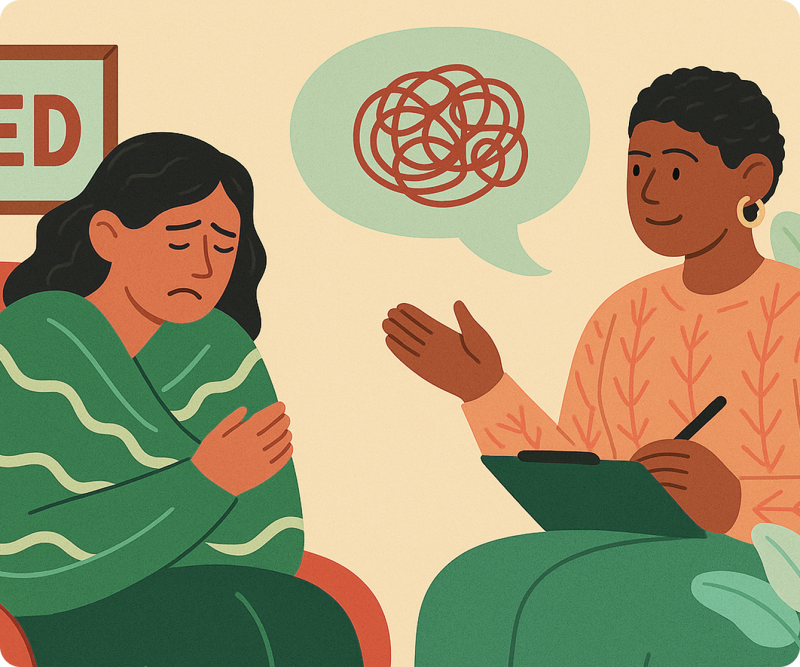
Recovery from Narcissistic Abuse
Narcissistic abuse is a form of psychological and emotional manipulation that can leave lasting scars on your mental health, self-esteem, and ability to trust. Unlike other forms of abuse, narcissistic abuse often involves manipulation that makes victims question their own reality and worth.
Understanding Narcissistic Abuse
If you’ve experienced narcissistic abuse from a partner, family member, friend, or colleague, the impacts can be profound and long-lasting. Recovery is possible, but it often requires specialised understanding of these unique dynamics and their effects on survivors.
Narcissistic abuse involves a pattern of manipulative behaviours designed to maintain control and superiority:
- Love-bombing followed by devaluation and discard cycles. This specific sequence is not always present and/or may not be linear
- Gaslighting that makes you question your memory and perceptions
- Projection where their negative traits are blamed on you
- Triangulation using others to create jealousy or insecurity
- Silent treatment as punishment or control
- Hoovering attempts to draw you back after separation
- Smear campaigns to damage your reputation with others
- Financial control or sabotage of your independence
- Isolation from supportive friends and family
- Constant criticism disguised as “helpful feedback”
- Moving goalposts so you can never meet their expectations
- Playing victim to avoid accountability for their behaviour
These tactics are often so subtle and gradual that victims don’t recognise them as abuse until significant damage has occurred.
Effects of Narcissistic Abuse
The impact of narcissistic abuse can be devastating and may include:
- Complex trauma symptoms including flashbacks and hypervigilance
- Severe self-doubt and constant second-guessing of your perceptions
- Anxiety and depression that may feel overwhelming
- Difficulty making decisions or trusting your own judgment
- Hypervigilance and walking on eggshells around others
- People-pleasing behaviours to avoid conflict or criticism
- Difficulty setting boundaries or advocating for yourself
- Fear of being “found out” as inadequate or worthless
- Social anxiety or withdrawal from relationships
- Cognitive symptoms like brain fog or memory problems
- Physical symptoms including fatigue, headaches, or autoimmune issues
These effects can persist long after the abusive relationship has ended, making recovery challenging without appropriate support.
Specialised Recovery Support
Recovery from narcissistic abuse requires understanding of its unique dynamics and effects. At Seed Psychology, our experienced psychologists use trauma-informed approaches including Complex Trauma therapy, DBT skills, and CBT to support survivors of narcissistic abuse.
Specialised therapy can help you:
- Recognise and validate your experiences of narcissistic abuse
- Rebuild your sense of reality and trust in your own perceptions
- Process complex trauma and reduce symptoms of hypervigilance
- Develop healthy boundaries and assertiveness skills
- Rebuild self-esteem and reclaim your authentic identity
- Learn to recognise red flags in future relationships
- Develop secure attachment patterns and trust in healthy relationships
- Process grief for the relationship you thought you had
- Build resilience and prevent future victimisation
Recovery takes time, but with proper support, you can reclaim your life and develop healthier, more fulfilling relationships.
You Deserve Authentic Love and Respect
Narcissistic abuse is not your fault, and the effects you’re experiencing are normal responses to abnormal treatment. You deserve relationships built on genuine respect, empathy, and mutual care.
Our compassionate team at Seed Psychology understands the unique challenges faced by survivors of narcissistic abuse. We provide a safe, validating space where you can heal from these experiences and rebuild your sense of self.
Connect with us to book an appointment with a psychologist in our Brunswick clinic or via telehealth Australia-wide.
Through connection,
change is possible
Our compassionate team at Seed Psychology is here to help you regain your wellbeing and navigate life’s challenges with greater confidence and clarity. Connect with us to book an appointment with a psychologist in our Brunswick clinic or via telehealth Australia-wide.
Available resources
Meet our amazing team of therapists
Our diverse team of psychologists offer individual, couples, and online therapy, as well as assessments. Beyond their expertise, they bring humanity and care, providing respectful, affirming support tailored to each person’s unique experience.
Freqeuently asked questions
-
Therapy is a shared process. While your Psychologist brings expertise, insight, and support, the most meaningful outcomes often come when you’re actively engaged in your own growth. This means being open and honest during sessions, reflecting between appointments, and being willing to try new approaches-even when it feels challenging. Therapy can take time, and progress isn’t always linear, but your commitment matters. Here are some ways to support your journey:
- Be open and honest with your Psychologist, even (and especially) if something feels hard to say.
- Give feedback if something doesn’t feel right or if your needs change.
- Stay open to exploring new ideas and practices within a safe, supportive space.
- Take notes or keep a journal to reflect on insights or patterns between sessions.
- Try to attend regularly-consistency is key to building momentum.
- Be kind to yourself. Growth can be uncomfortable at times, but that doesn’t mean you’re doing it wrong.
- Invest in your wellbeing outside of therapy by building habits and routines that nourish you.
Therapy is a courageous act of self-investment. By showing up and staying engaged, you create space for real and lasting change.
-
Our experienced team of Psychologists offers warm, evidence-based support that’s collaborative, inclusive and grounded in genuine understanding. We provide individual, relationship or family therapy for a wide range of concerns. Additionally, we offer couples therapy, online therapy, psychological assessments (including ADHD and Autism Spectrum Assessments), and workshops.
-
There’s no one-size-fits-all answer to how long therapy takes. At Seed Psychology, we tailor each intervention to your individual needs, goals, and circumstances. Some people come to therapy to navigate a specific challenge, like managing anxiety, adjusting to a life transition, or processing a relationship difficulty. Others may be seeking deeper emotional growth or support for longer-term concerns. Because of this, the number of sessions can vary. Many clients attend between 6 and 18 sessions, though some need fewer and others continue for longer. Your Psychologist will discuss an estimated treatment plan with you after your initial assessment and continue checking in over time to ensure it feels helpful and aligned with your goals. Ultimately, the pace and duration of therapy is something we navigate together, guided by your progress, preferences, and what feels right for you.
-
Consultations with a psychologist last between 50 and 60 minutes.
-
At Seed Psychology, your safety and wellbeing are our highest priorities. While we are here to support you through regular therapy sessions, we are not a crisis service and may not be available outside of scheduled appointments. If you or someone you care about is in immediate danger, experiencing a mental health crisis, or needs urgent support, it’s important to seek help straight away through the appropriate emergency or crisis services. You can find a list of trusted organisations and services here that can provide immediate support when you need it most.








